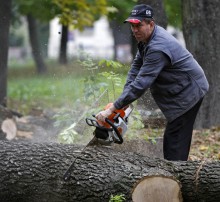This year, the city authorities decided to replace poplars with other kinds of trees due to the amount of fluff produced by the former. A draft decision has already been registered in Kyiv city council. But environmentalists insist that the benefits of poplar trees are much higher than the detriment.
“Poplar has the exceptional environmental properties unlike any other tree,” says Kateryna Norenko, expert of the “Environment-People-Law” organization. “One specimen per season is able to absorb up to 50 kilograms of soot, as opposed to chestnut, a specimen of which absorbs only around 16 kilograms. If we leave Kyiv without poplars for a long time we get another respiratory problem, as the inhalation of large quantities of soot would cause a narrowing of the airways. A person constantly exposed to soot will suffer the shortness of breath, which is an irreversible process. In addition, one poplar tree produces as much oxygen per season as one person would need for a year. Of course, the poplars should be replaced in places where they have reached a ripe old age, but only with other poplars.”
Online service “Contact center of Kyiv” has a survey where people of Kyiv express their opinions about the replacing of the poplars and which trees should be planted instead. Norenko is surprised by the selection of the replacement options.
“One of the options mentioned is acacia. This type is uncharacteristic for Ukraine’s natural ecosystem; it spreads quickly and takes new territory. In the EU, this kind of plant is under the quarantine, there are programs to eliminate acacia as dangerous species. Also, the survey suggests Canadian maple. Similarly, in no way it should replace poplar. This plant invades almost every ecosystem, displaces other species, and impoverishes the biodiversity. In my opinion, it would be best to simply plant new poplars. There are species that produce no fluff. And anyway, if the trees are watered during the poplar flowering, the fluff does not scatter. The situation can have many solutions, one should not take decisions in haste,” says the ecologist.
Another thing is that a lot of poplars in Kyiv are parts of protected natural objects, so their felling would be at odds with the current legislation. “I know at least 20 parks in Kyiv that are the subjects of natural reserve fund and on whose territory the poplars grow,” says Oleksii Vasyliuk, deputy head of the National Ecological Centre. “We have already sent an appeal to the Kyiv City Council in order to ban the felling of poplars, but now we must wait one month to have them consider our query and adopt the relevant decision regarding it.”
Although the decision to replace the poplars is still pending in the City Council, the poplars are now being cut down on the Shevchenko Boulevard. However, the environmentalists hope that some of poplars in Kyiv might be saved.







